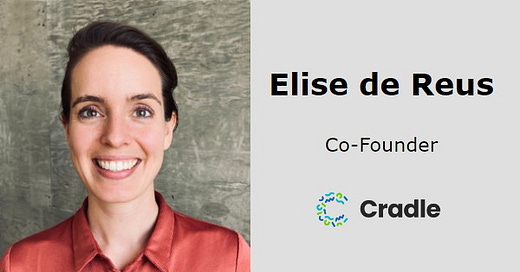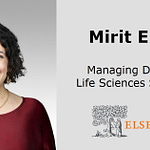As we stand at the crossroads of artificial intelligence (AI) and biotech, what future awaits protein design, and how are current innovations shaping the landscape of healthcare and sustainability?
In this episode, I sat down with Dr. Elise de Reus from Cradle, who sheds light on how the field has evolved post-AlphaFold and the pivotal role Cradle plays in pushing the boundaries of protein optimization using generative artificial intelligence (AI).
Cradle, a Dutch-Swiss biotech startup founded in 2021, is advancing the field of protein design by leveraging generative artificial intelligence (AI).
The company, with its headquarters in Delft, the Netherlands, and additional operations in Zurich, Switzerland, has developed a web-based software platform aimed at accelerating the R&D pipelines in biotechnology.
This platform enables scientists and experimentalists to design and engineer proteins more efficiently by breaking down traditional data roadblocks without the need for specialized knowledge in bioinformatics or machine learning.
In November 2023, Cradle raised $24 million in a Series A funding round, bringing its total funding to $33 million. The round was led by Index Ventures, with participation from Kindred Capital and notable angel investors such as Chris Gibson, co-founder and CEO of Recursion, and Tom Glocer, former CEO of Thomson Reuters.
The company plans to further expand its team and build out additional laboratory and engineering facilities in Amsterdam in 2024.
Since coming out of stealth mode in 2022, Cradle has onboarded several industry partners, including Johnson & Johnson Innovation, Novozymes, and Twist Bioscience, and is now working on over a dozen of R&D projects.
These projects span a wide range of protein modalities, such as enzymes, vaccines, peptides, and antibodies, aiming at improving various protein properties like stability, expression, activity, binding affinity, and specificity.
Cradle's technology has proven to double the speed of most projects compared to industry benchmarks, demonstrating its potential to significantly accelerate the design and optimization of proteins
In our interview, Elise sheds light on proteins' crucial functions beyond drug discovery, including their contribution to planetary health, and how Cradle's software-as-a-service is revolutionizing R&D workflows.
By integrating AI into the iterative cycle of design, build, and test, Cradle is not only speeding up the discovery process but also democratizing it for teams across the globe.
The discussion also touches upon the inherent challenges of melding AI with biological research, particularly the validation of AI-generated designs in the wet lab. Elise elaborates on Cradle's approach to navigating these obstacles, underscoring the broader implications of their work across industries, from pharma to food sustainability.
A significant part of our conversation revolves around the evolving career landscape in biotech and AI.
Elise passionately speaks about the burgeoning opportunities for information technologies and machine learning professionals within the life sciences. She encourages those with a tech background to venture into bioengineering. She highlights the interdisciplinary nature of modern scientific breakthroughs and Cradle's own diverse team as prime examples of the innovation that cross-disciplinary expertise can foster.
Cradle is one of 25 companies forming a new Ginkgo Technology Network ecosystem for synthetic biology.











Share this post